Snapshot of a Year of Progress
Between July 1, 2023, And June 30, 2024, FDA approved 15 new anticancer therapeutics, 15 previously approved therapeutics for treating new cancer types, and one new imaging agent.
Home > AACR Cancer Progress Report > Contents
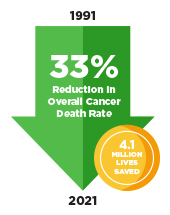
Between July 1, 2023, And June 30, 2024, FDA approved 15 new anticancer therapeutics, 15 previously approved therapeutics for treating new cancer types, and one new imaging agent.
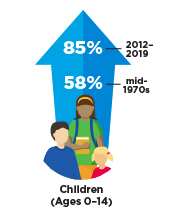
In the United States, the overall cancer death rate has been steadily declining since the 1990s, translating into more than 4.1 million cancer deaths avoided. However, progress has not been even against all cancer types or stages, and there are inequities in the cancer burden.
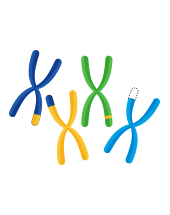
Cancer is a group of diseases in which some of the body’s cells acquire changes that cause them to divide unchecked and spread to other parts of the body. Changes inside the cell as well as in the tumor environment can influence cancer initiation and progression.

40% of all cancers in the U.S. are associated with modifiable risk factors. The significant decline in cancer mortality over the past 30 years is largely attributable to reductions in smoking through public health campaigns and policy initiatives.
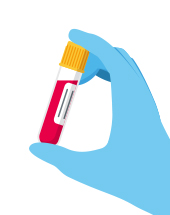
The goal of cancer screening is to reduce the burden of the disease in the population. When detected early, cancer may require less aggressive treatments and may be curable.
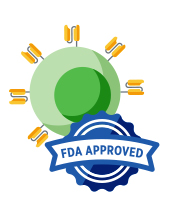
Researchers are harnessing knowledge of the cellular and molecular underpinnings of cancer initiation and progression to develop safer and more effective treatments for patients.

Cancer patients and survivors face a multitude of physical, emotional, and financial challenges. Eating a healthy diet, reducing alcohol and tobacco use, and exercising can improve survivor outcomes.

The unprecedented advances against cancer in recent decades stem from breakthrough discoveries and technological advances across medicine in areas such as noninvasive imaging and cancer engineering.

Robust investment in federal agencies like NIH and NCI is vital to making further progress, including improvements in cancer screening, treatment, and survivorship.
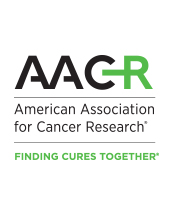
The unprecedented advances against cancer documented in this report can be attributed to the bipartisan and steadfast support of Congress.

To continue the remarkable progress against cancer, the AACR calls on Congress to provide robust, sustained, and predictable annual funding increases for NIH, NCI, FDA, and CDC in FY 2025 and beyond.

Through its programs and services, AACR fosters cancer research; accelerates the dissemination of new research findings; promotes science education and training; and advances the understanding of cancer etiology, prevention, diagnosis, and treatment throughout the world.

We are living in a transformative era for cancer research, powered by breakthroughs across all areas of cancer science and medicine. With sustained commitment and investment, we can move closer to the goal of preventing and curing all cancers for all populations.
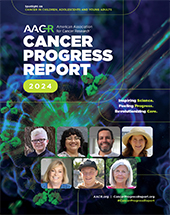
We are witnessing tremendous progress against cancer, which is attributable to research discoveries in basic, translational, clinical, and population science as well as technological innovations that are continually improving cancer prevention, detection, diagnosis, and treatment.

Patricia M. LoRusso, DO, PhD (hc), FAACR, serves as the chair of the Steering Committee for the AACR Cancer Progress Report 2024.
Your donation to the American Association for Cancer Research helps our more than 61,000 members worldwide drive progress against cancer.
Donate Today